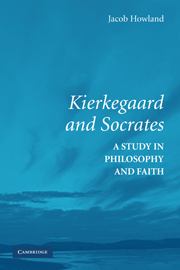Book contents
- Frontmatter
- Contents
- Note on Texts and Translations
- Acknowledgments
- Kierkegaard and Socrates
- Introduction
- 1 Johannes Climacus, Socratic Philosopher
- 2 Climacus's Thought-Project
- 3 Platonic Interlude: Eros and the God
- 4 Climacus's Poetical Venture
- 5 The Paradox and the Passion of Thought
- 6 Self-Love and Offense
- 7 Faith and the Contemporary Follower
- 8 Climacan Interlude: On Historical Necessity
- 9 The Follower at Second Hand and The Moral
- 10 Socrates in Postscript
- Epilogue: Kierkegaard on Christ and Socrates
- Works Cited
- Index
1 - Johannes Climacus, Socratic Philosopher
Published online by Cambridge University Press: 01 December 2009
- Frontmatter
- Contents
- Note on Texts and Translations
- Acknowledgments
- Kierkegaard and Socrates
- Introduction
- 1 Johannes Climacus, Socratic Philosopher
- 2 Climacus's Thought-Project
- 3 Platonic Interlude: Eros and the God
- 4 Climacus's Poetical Venture
- 5 The Paradox and the Passion of Thought
- 6 Self-Love and Offense
- 7 Faith and the Contemporary Follower
- 8 Climacan Interlude: On Historical Necessity
- 9 The Follower at Second Hand and The Moral
- 10 Socrates in Postscript
- Epilogue: Kierkegaard on Christ and Socrates
- Works Cited
- Index
Summary
The relationship between philosophy and religious faith is the central theme of two of Kierkegaard's pseudonymous volumes. Philosophical Fragments, or A Fragment of Philosophy, by Johannes Climacus, edited by S. Kierkegaard, was published in 1844. Concluding Unscientific Postscript to Philosophical Fragments: A Mimical-Pathetical-Dialectical Compilation, An Existential Contribution, also by Johannes Climacus, edited by S. Kierkegaard, appeared two years later, in 1846. These are the only works by Climacus in the Kierkegaardean corpus.
Kierkegaard first mentions the name of Climacus in connection with the speculative philosophy of G W F. Hegel (1770–1831), whose followers, including theologians as well as philosophers, played a leading role in the Danish intellectual scene of the day. In a journal entry dated January 20, 1839, he writes: “Hegel is a Johannes Climacus who does not storm the heavens as do the giants – by setting mountain upon mountain – but climbs up to them by means of his syllogisms.” Hegel ascends to the “heaven” of absolute knowledge stepwise, on the basis of a series of philosophical arguments. This occurs in his Phenomenology of Spirit, which he envisions as furnishing the natural or prephilosophic consciousness with a “ladder” to the “absolute” beginning of his philosophical system – the standpoint of absolute spirit and absolute knowing. Kierkegaard's allusion to the rebellious giants of Greek myth who made war on Zeus after the defeat of the Titans hints that, in his view, Hegel's philosophical ascent is both hybristic and illegitimate – a point to which we shall return in due course.
- Type
- Chapter
- Information
- Kierkegaard and SocratesA Study in Philosophy and Faith, pp. 10 - 27Publisher: Cambridge University PressPrint publication year: 2006

